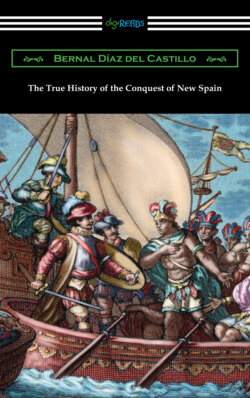Читать книгу The True History of the Conquest of New Spain - Bernal Diaz del Castillo - Страница 20
На сайте Литреса книга снята с продажи.
CHAPTER XIV.
ОглавлениеHow we came into the harbour of San Juan de Culua.
Having disembarked on a part of the coast where it was very sandy, we were annoyed by such multitudes of muschetoes that we were forced to construct ourselves huts on the great downs and in the tops of trees: this, being done, we carefully examined the harbour in our boats, and were fully satisfied that it contained a good anchorage, it being moreover sheltered against the north wind by the island, to which our general now proceeded with thirty men all well armed. Here we found a temple on which stood the great and abominable-looking god Tetzcatlipuca, surrounded by four Indians, dressed in wide black cloaks, and with flying hair, in the same way as our canons or Dominicans wear it. These were priests, who had that very day sacrificed two boys, whose bodies they had ripped up, and then offered their bleeding hearts to the horrible idol. They were going to perfume us in the same way they had done their gods; and though it smelt like our incense, we would not suffer them, so shocked were we at the sight of the two boys whom they had recently murdered, and disgusted with their abominations. Our captain questioned the Indian Francisco whom we had brought with us from the Bandera stream as to what was meant by all this, for he seemed rather an intelligent person; having, at that time, as I have already stated, no interpreter, our captain put these questions to him by means of signs. Francisco returned for answer that this sacrifice had been ordered by the people of Culua; but, as it was difficult for him to pronounce this latter word, he kept continually saying Olua, Olua. From the circumstance of our commander himself being present, and that his Christian name was Juan, and it happening to be the feast of St. John, we gave this small island the name of San Juan de Ulua. This harbour was ever after much frequented. Great numbers of ships have been refitted there, and all merchandise for Mexico and New Spain are here shipped or unladen. During the time we were encamped on these downs, numbers of Indians from the surrounding districts, brought us their gold trinkets in exchange for our goods; but there was so little of it, and that so very inferior in quality, that we scarcely troubled ourselves about it. We remained, nevertheless, seven days in the huts we had constructed, though we were constantly annoyed by swarms of muschetoes, which rendered our stay most uncomfortable. As we had now been so long at sea, and had fully convinced ourselves that it was no island, but a continent, we had discovered, containing considerable towns; as our cassave-bread was become quite mouldy and unfit for eating; considering, moreover, that our numbers were too small to think of making any settlement here, particularly as we had lost ten of our men in consequence of their wounds, besides having four others dangerously ill,—we determined to forward Diego Velasquez an account of the state of affairs, and desire him to send us succours; indeed Grijalva had a great mind to have founded a colony even with the few men we had to spare. Our captain had throughout shown a magnanimous spirit, and proved himself a brave soldier, let the historian Gomara say anything to the contrary he likes. Pedro de Alvarado was selected to go on this mission to Cuba, with the ship San Sebastian, which had become rather leaky: this vessel could be refitted there, and return with succours and provisions. He also took with him all the gold we had bartered for, the cotton stuffs presented us by the Indians, and our sick. Our principal officers, moreover, each sent Diego Velasquez a written account, according to their several views, of all we had seen. We will now leave Pedro de Alvarado to his own good fortune on his voyage to Cuba, and relate what happened to the vessel which Diego Velasquez sent in quest of us.
